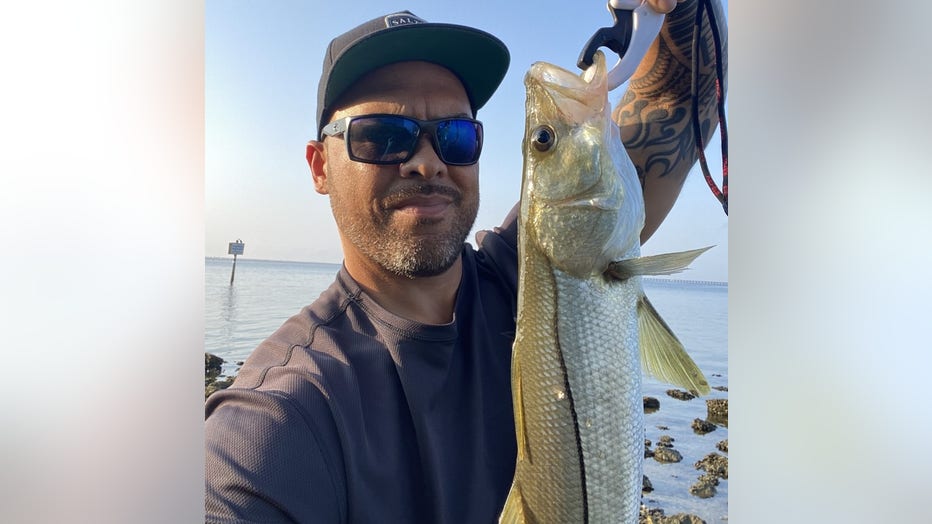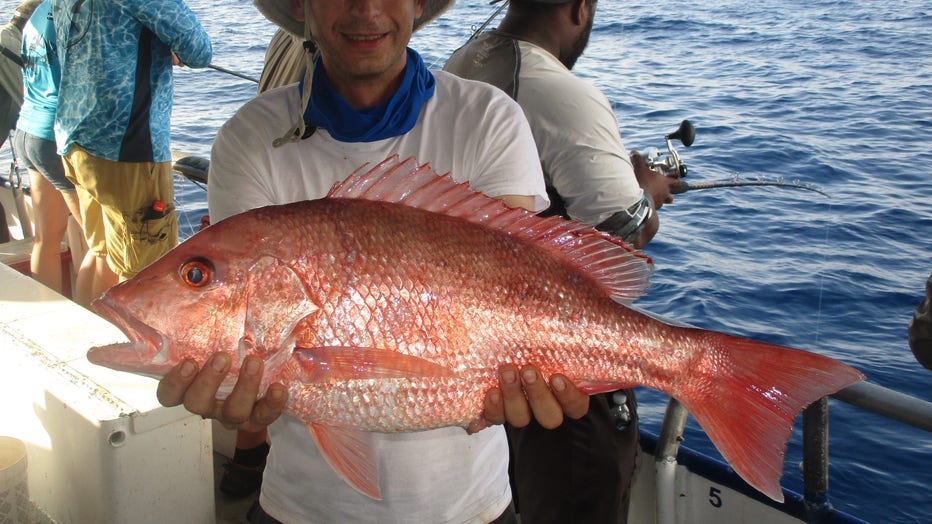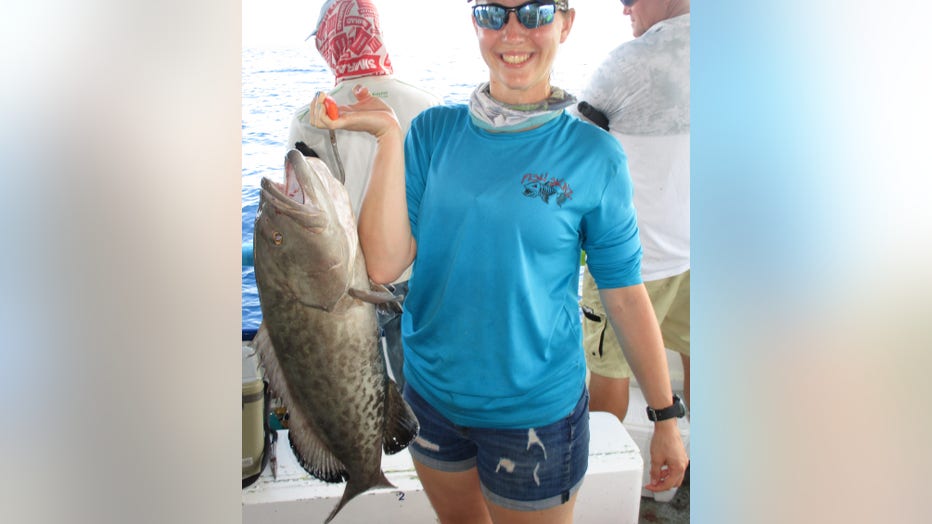Fishing Report: July 30, 2021

Red snapper season is coming to a close
Offshore, the red snapper season coming to a close and but anglers are looking ahead to the amberjack and triggerfish season re-opening on August 1, says Captain Dylan Hubbard over at Hubbard's Marina.
MADEIRA BEACH, Fla. - Every Friday morning, Captain Dylan Hubbard of Hubbard's Marina joins Good Day to fill viewers in on his fishing forecast as we head into the weekend.
Here is his fishing report for July 30, 2021.
Inshore
Finally, a bit of good news to report. It looks like the bloom has subsided a bit inside Tampa Bay and most of the area is seeing a favorable forecast in the form of a declining overall concentration.
However, John’s Pass, our immediate area around Treasure Island, Madeira Beach, and our pass seems to be the mecca of the most concentrated bloom, according to Thursday’s forecast by FWC and USF.
We are seeing a decent bite of fish around the area overall but you have to work to find the clean pockets of water. We are seeing most of the action around the northern Tampa Bay area. The Anna Maria Island area also has had some great cleaner water trends. Plus, around the rivers haven’t seen the big surges of red tide disaster like a majority of our bay. If you can find those pockets between the patchy areas of red tide the typical summertime trends have held true.

Snook (Photo courtesy Hubbard's Marina)
Trout hang on those deeper edges and around those potholes and cuts. Snook are stacking up along the beaches and in the passes gearing up for their summertime spawn. Tarpon are around, but we haven’t seen the concentrations like we normally would this year due in part to the weather.
Red tide is really nailing the final nail in our tarpon season’s coffin.
Nearshore and offshore
Red tide is now extending into the near shore waters as far as around 12 miles out in areas.
We are now fishing even further on our half-day fishing trips compared to normal until this bloom and concentration near shore subside.
Luckily, once you get deeper near shore around 60-100 feet of water, that area seems to be unaffected at least. Plus, the red grouper bite has been steady and, overall, pretty stellar compared to the recent years.
We are seeing a dozen or more red grouper in the nice keeper size when fishing the deeper near shore waters.
We are also seeing a big push in the plentiful and larger lane snapper out deeper right now too near shore. Plus, a handful of mangrove snappers are also possible near shore as well right now.

Red snapper (Photo courtesy Hubbard's Marina)
Hogfish, overall, are very slow still but seeing an uptick in the overall trend as of late due to this red tide pushing them out and further concentrating them along these areas of hard bottom and live rock.
Offshore, we are seeing the red snapper season coming to a close and we're looking ahead to the amberjack and triggerfish season re-opening come August 1.
However, keep in mind, the amberjack fishing has been extremely poor compared to years past, but we will do our best to give them a shot on each long-range trip as long as the agency deems possible.
Triggerfish overall are much more common the deeper you go, and they got to be 15 inches to the fork to keep now so you want to make sure you are targeting them with lighter tackle and smaller hooks. Right now, we’re seeing a big spike in these larger offshore triggerfish and we’re hoping to capitalize on them while we see the season open for a limited time starting this first of august.
DON’T BE A FOOL, bring a venting tool & Descending device
Keep in mind the importance of dead discards and discard mortality when engaged in near shore or offshore fishing. How many do you know right now that are all for catching and releasing snook, redfish, and trout but will be the first in line to kill a mangrove snapper, gag grouper, or red snapper? But the attitude completely changes when discussing these offshore species?

Gag grouper (Photo courtesy Hubbard's Marina)
Plus, the same person inshore that will hold their breath and wet their hands before handling a breeder snook will go offshore and then cull through 20 red snapper before keeping their two red snapper they deem large enough to fill their two-fish bag limits. Meanwhile, the other 18 they released will often end up suffering fatal damage if not properly descended or vented?
Please help us to spread the word on the importance of descending or venting your released fish. Descending devices are most easy to use and quick to pick up on their use. They are most effective for most anglers.
However, an expert and precise angler with proper training and tons of experience can use a venting tool properly with similar outcomes. A venting tool requires you to pierce the fish while most descending devices are much less invasive. While using a venting tool, it is imperative you pierce them in the exact right spot, and you do not go but a quarter-inch or less in the fish. Most venting tools require you to ‘choke up’ on the tool to prevent over-penetration into major organs.
When fishing deep water, especially in the hot summer months, please make sure to treat all fish intended to be released like that breeder snook inshore and minimize the time it takes you to get him from the bottom to the boat using heavier proper tackle, not an ultra-light spinning reel.
Then once onboard, minimize the time out of the water. Then use a proper de-hooking tool and then, for the love of God, use a descending device or venting tool PROPERLY to ensure that fish has a chance to live another day.
Three things will help ensure the survivability of those fish released offshore:
- Making sure they are brought up quickly and do not expend all their energy in the fight.
- Make sure they are unhooked smoothly, easily, and as quickly as possible.
- Finally, make sure they spend the least amount of time at the surface at negative pressures where barotrauma exponentially increases its effect with each passing second.
Also, keep in mind when the water is warm, there is less dissolved oxygen content and the chances of barotrauma increase even more while its effects can be even more deadly.
LINK: Here’s all the information and more on barotrauma and how to mitigate that fatal damage to your future offshore catch
**Note: I recommend the Salt Strong articles at the bottom of the page under ‘webpages.’ I helped them develop those personally.
STATE SURVEY to improve recreational data and access
It is imperative that you have your Gulf Reef Fish survey endorsement on your fishing license.
You should get one if you are a private recreational angler or diver fishing from a private boat anywhere in Florida who intends to harvest, attempt to harvest or possess one or more of the following reef fish species: mutton snapper, yellowtail snapper, hogfish, red snapper, vermilion snapper, gag grouper, red grouper, black grouper, greater amberjack, lesser amberjack, banded rudderfish, almaco jack, gray triggerfish, Gag grouper, Red grouper, Scamp grouper, Mangrove snapper, Lane snapper, Kingfish, Tuna, or Mahi mahi.
Here is all the information and more on that program and how you can sign up.
TERMS OF REFERENCE:
INSHORE – from the back bays out to the bridges and including right on the beaches
NEAR SHORE – From the beaches out to 20 miles, or up to 100ft of water
OFFSHORE – from 20 miles or 100ft and beyond
For more fishing reports, photos, videos and more check out Hubbard’s Marina on Facebook, Instagram, YouTube, or Snapchat. Just simply search "HubbardsMarina" and do not forget our family motto, "If you’re too busy to go fishing, you’re just too busy!

